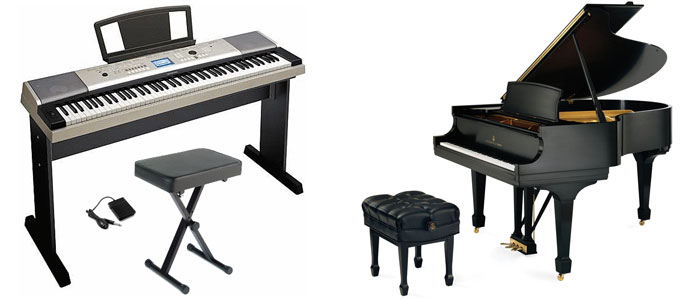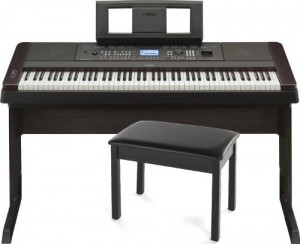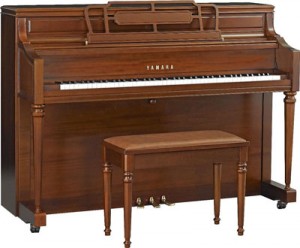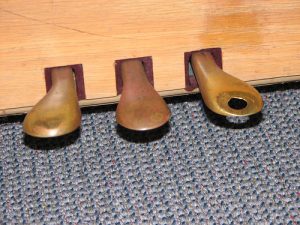A lot of my students ask me this question: Which is better, a keyboard or a piano? In my professional opinion, the answer could actually be: either one! Let me explain why.

Considering A Starter Instrument
When you’re starting to learn a handheld instrument, you’ll typically buy a student instrument. If your 7 year old son is learning violin, he’ll probably need a half size violin at first. Later, once he is ready to play it, that half size violin can easily be replaced by a full size violin. Similarly, you may buy a starter flute for your daughter when she joins the band in 5th grade. It’ll be perfect for starting out, but by high school she may need something a little better. Just like these examples, a piano/keyboard is an instrument that can grow with you. Should you choose to start out on a keyboard, you can save up for a digital piano or piano as your skill develops.
The benefits of starter instruments are many! First of all, typically they’re a lot more affordable. You wouldn’t drop hundreds of thousands of dollars on a Stradivarius violin for your child to learn on. Similarly, you wouldn’t drop that kind of money on a Steinway concert grand piano to learn on. Instead, you’d find something in your budget and work with that. Second, consider the investment and commitment. Is this a life-long dream that you’re finally fulfilling after years of saving up for a piano? Or is this something your child is interested in learning now but you’re not sure if she’ll stick with it as she gets older? Be realistic and consider which is the better investment for your situation. Lastly, if you have a good teacher, it doesn’t matter what instrument you’re learning on because they’ll be able to help you anyway. Yes, it’s true! If you learn how to play a scale on a keyboard, it’s going to be exactly the same as learning how to play a scale on a piano. Since keyboards come with all kinds of functions to help them feel like a real piano, they can be perfectly fine to learn on.
Pros and Cons of Keyboards
 Keyboards are definitely the more affordable option. They’re also more convenient, as they’re lightweight and easily moved around from place to place. This is definitely something to consider if you’re going to be moving any time soon. They also have volume control. Usually it’s just a matter of pressing the volume button up or down, but you can even play with headphones plugged in so that only you can hear what you’re playing. However, even if you get the best quality keyboard there is, it still is not a piano. It will feel different and it will not sound quite the same because it’s impossible to perfectly duplicate the authentic sound of a piano. The advanced or advancing pianist can always get by with a good keyboard, but he will ultimately need a good piano to really thrive.
Keyboards are definitely the more affordable option. They’re also more convenient, as they’re lightweight and easily moved around from place to place. This is definitely something to consider if you’re going to be moving any time soon. They also have volume control. Usually it’s just a matter of pressing the volume button up or down, but you can even play with headphones plugged in so that only you can hear what you’re playing. However, even if you get the best quality keyboard there is, it still is not a piano. It will feel different and it will not sound quite the same because it’s impossible to perfectly duplicate the authentic sound of a piano. The advanced or advancing pianist can always get by with a good keyboard, but he will ultimately need a good piano to really thrive.
Pros and Cons of Pianos
 A good piano is the real deal. It’ll have the correct feel, correct sound, and produce the correct experience. There’s nothing quite like sitting down to a beautiful, well-tuned piano and playing it. It’s easy to feel the difference between that and a keyboard. However, pianos are ultimately much more expensive than keyboards, particularly if you’re shopping for a good piano. And if you’re going to get a real piano, there’s little point in buying a cheap one because these will usually have more problems than they’re worth. Convenience goes down when you purchase a piano because they are much heavier and cannot be easily relocated. Ill attempts to move these heavy instruments can cause significant damage. They also don’t have the flexibility of using headphones to isolate the sound; everyone in range of the piano will hear it. And pianos also require careful upkeep. A piano should be tuned once every 6 months or so, and if you neglect this for too long, it could cause permanent damage to the strings.
A good piano is the real deal. It’ll have the correct feel, correct sound, and produce the correct experience. There’s nothing quite like sitting down to a beautiful, well-tuned piano and playing it. It’s easy to feel the difference between that and a keyboard. However, pianos are ultimately much more expensive than keyboards, particularly if you’re shopping for a good piano. And if you’re going to get a real piano, there’s little point in buying a cheap one because these will usually have more problems than they’re worth. Convenience goes down when you purchase a piano because they are much heavier and cannot be easily relocated. Ill attempts to move these heavy instruments can cause significant damage. They also don’t have the flexibility of using headphones to isolate the sound; everyone in range of the piano will hear it. And pianos also require careful upkeep. A piano should be tuned once every 6 months or so, and if you neglect this for too long, it could cause permanent damage to the strings.
In Summary…
In summary, keyboards and pianos of all types have their pros and cons. And let’s not forget digital pianos and everything else in between! There’s no question that a true piano will provide the most beautiful sound and playing experience. But these can come at a cost that is more than you can afford. Ultimately you have to decide which is best for you. In my opinion, a keyboard or digital piano can be just as good as a piano for learning on. As a long-time pianist, I’ve played on every kind of keyboard from a dinky old half-size keyboard to a full-size Yamaha keyboard/digital piano with graded hammer keys, touch sensitivity, high polyphony, and all the bells and whistles to make it feel like a piano. I’ve also played on every kind of piano from a severely out of tune upright Wurlitzer with broken keys to a beautiful, rich-toned 8 foot ebony Steinway grand. And you know what? I was able to make music on all of them.
When it comes down to choosing, it’s about what’s best for your situation. Whether you choose a keyboard or a piano, with a quality teacher and practice on your part, you can make beautiful music playing either one.

